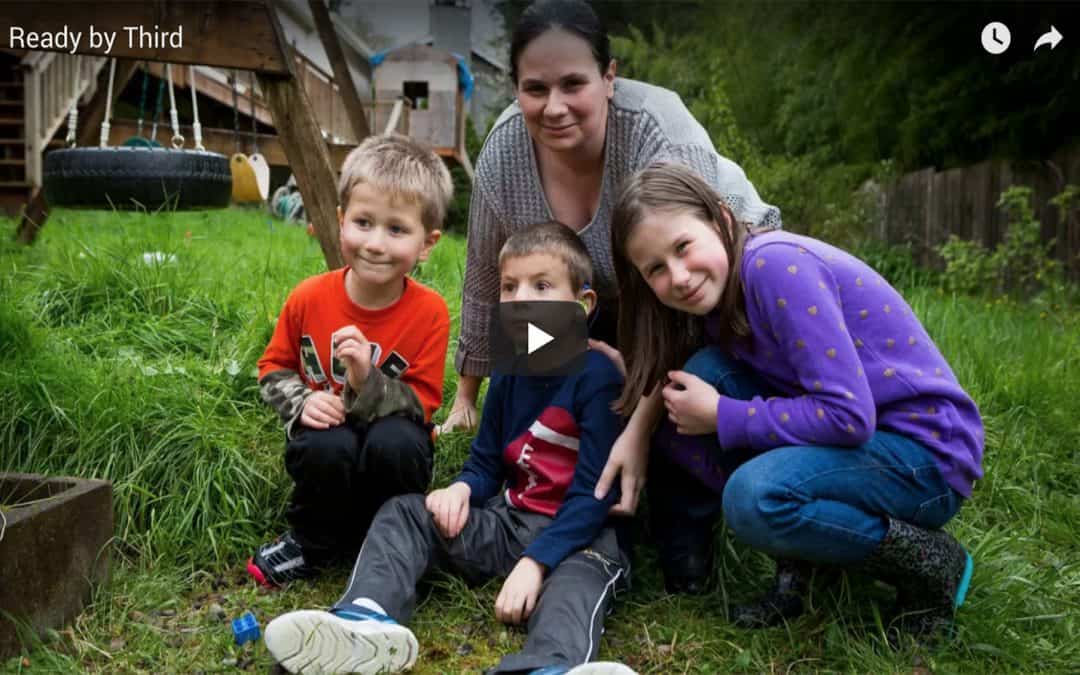
Ready by 3rd
Ready by 3rd, featured at our 2017 Make It Your Business luncheon, features families and young learners benefiting from home visiting services, Early Intervention/Early Childhood Special Education, and preschool.

Ready by 3rd, featured at our 2017 Make It Your Business luncheon, features families and young learners benefiting from home visiting services, Early Intervention/Early Childhood Special Education, and preschool.
The Campaign for Grade Level Reading announced its 5th Annual Pacesetters Honors today and recognized three communities in Oregon among 48 across the nation for working to improve school readiness, school attendance, and summer learning.
Lane County
The GLR Campaign recognized Lane County as a 2016 Pacesetter for making population-level measurable progress for low-income children in school readiness and summer learning. United Way of Lane County serves as the backbone support organization for the Lane Early Learning Alliance, which is focused on working together with cross sector partners to create systems of services and supports that are aligned, coordinated, and family-centered to ensure children are prepared to succeed in school and life.
Through Lane County’s collaborative efforts with partners, developmental screening rates for children have increased from 28.3% in 2013 to 67% in 2015, indicating a significant improvement in school readiness for low-income children. Lane County has also implemented and scaled a successful Kids in Transition to School (KITS) program to improve summer learning and strengthen parent success. The KITS program has scaled significantly, from serving 40 children at two sites in 2011 to serving 368 children at 24 school sites in 2016. Program outcomes include a 28% drop in the number children at risk for reading failure, as well as indicators of parental confidence at supporting their children’s learning and positive behaviors. The Campaign would especially like to recognize Lane County for their exemplary work to achieve success, scale, and sustainability of GLR efforts and outcomes.
Wallowa
The GLR Campaign also recognized Wallowa as a 2016 Pacesetter for making population-level measurable progress for low-income children in school readiness. Wallowa is a frontier community with extreme geographic isolation, high levels of poverty, and extremely limited resources. Despite these challenges, an innovative partnership between Winding Waters Clinic and Building Healthy Families has been supporting parent success, school readiness, and holistic health through efforts such as parent education, developmental screenings, Reach Out and Read, and awareness campaigns.
Through these efforts, Wallowa County has seen astounding improvements in school readiness through rates of developmental screenings, with 0% of children birth to age 5 receiving a developmental screening during well-child visits in 2012 to 100% of children birth to age 5 receiving a developmental screening in well-child visits in 2016. Winding Waters Clinic serves 90% of Wallowa County’s low-income population and is making an incredible difference in promoting healthy child development and school readiness in the community.
Earl Boyles
Earl Boyles Elementary in Southeast Portland was recognized as a 2016 Pacesetter for integrating efforts to support parent success and address the health determinants of early school success. Earl Boyles is in the David Douglas School District, one of the state’s highest-need districts. It is a culturally and linguistically diverse community, with more than 20 languages spoken at the school and approximately 70 district-wide.
Since 2012, Earl Boyles has scaled from 1 to 3 preschool classrooms for 3- and 4-year-olds with all catchment 4-year-olds being served and made significant advances in strengthening early learning. The school has:
The community uses a data-driven approach and has seen positive outcomes in the areas of school readiness and chronic absence.
Read the press release from The Campaign for Grade-Level Reading
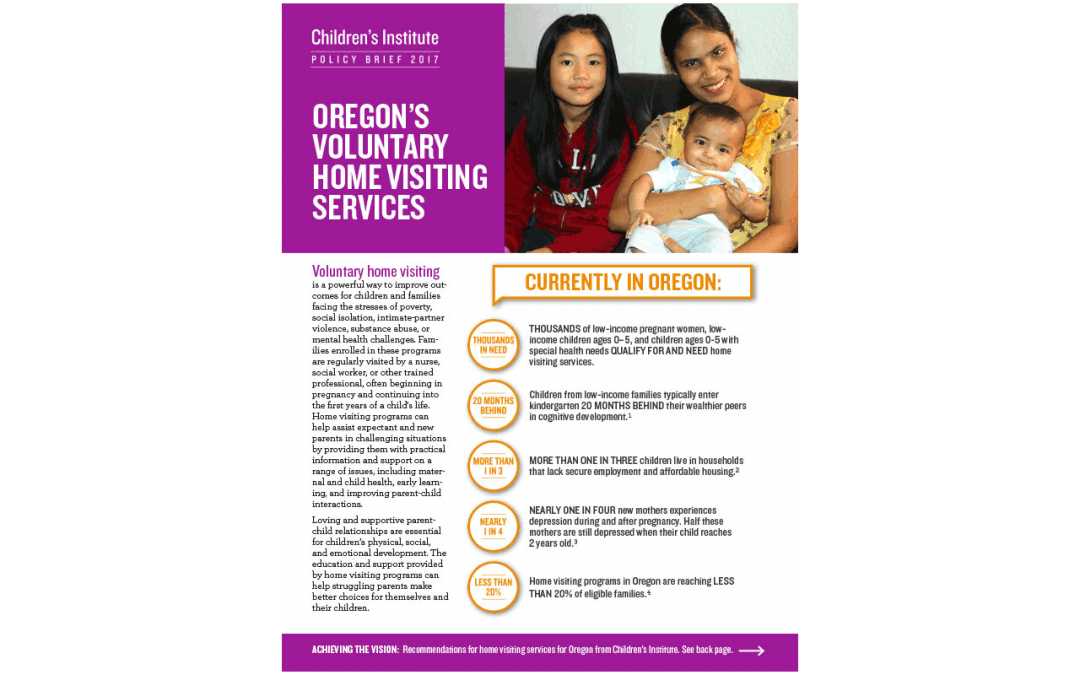
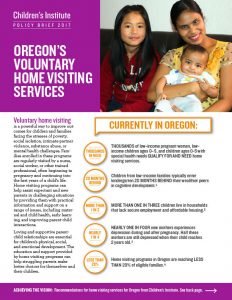 Children’s Institute releases its latest policy brief about the importance of voluntary home visiting services. Currently, over 18,000 kids and their families receive voluntary home visiting services in Oregon. This brief summarizes the benefits of home visiting and makes recommendations for improving and increasing the services.
Children’s Institute releases its latest policy brief about the importance of voluntary home visiting services. Currently, over 18,000 kids and their families receive voluntary home visiting services in Oregon. This brief summarizes the benefits of home visiting and makes recommendations for improving and increasing the services.
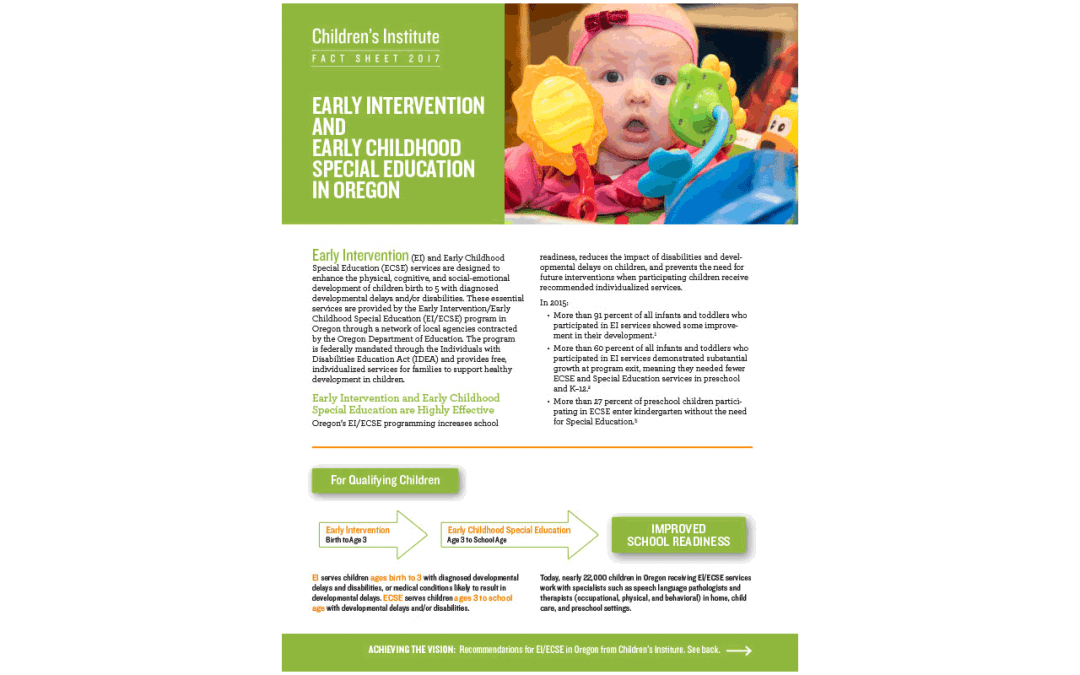
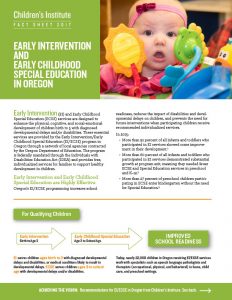 Children’s Institute releases its latest policy fact sheet about the importance of Early Intervention and Early Childhood Special Education (EI/ECSE) in Oregon. Nearly 22,000 young children in Oregon receive EI/ECSE services. CI’s new fact sheet explains the role of both services in enhancing the development of children birth to five yeard-old with diagnosed developmental disabilities and delays.
Children’s Institute releases its latest policy fact sheet about the importance of Early Intervention and Early Childhood Special Education (EI/ECSE) in Oregon. Nearly 22,000 young children in Oregon receive EI/ECSE services. CI’s new fact sheet explains the role of both services in enhancing the development of children birth to five yeard-old with diagnosed developmental disabilities and delays.
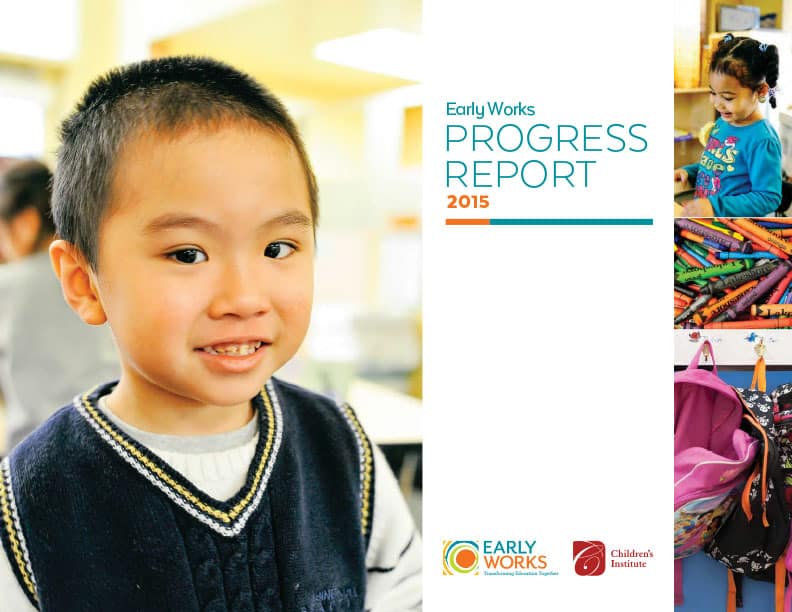
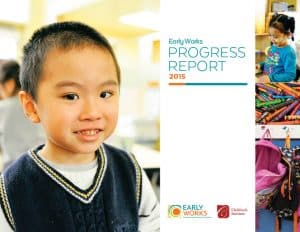 This is our first report on the progress that children and families are making at the two Early Works sites – east Portland’s Early Boyles Elementary and Yoncalla Elementary in rural Yoncalla. The report is based on data from an annual evaluation of the Early Works initiative conducted by Portland State University. The initiative works to implement an integrated set of policies and services in early learning, health and family engagement and brings together various partners working on behalf of children and families. The goal: to create a seamless system that supports children in their critical years from birth through age 8.
This is our first report on the progress that children and families are making at the two Early Works sites – east Portland’s Early Boyles Elementary and Yoncalla Elementary in rural Yoncalla. The report is based on data from an annual evaluation of the Early Works initiative conducted by Portland State University. The initiative works to implement an integrated set of policies and services in early learning, health and family engagement and brings together various partners working on behalf of children and families. The goal: to create a seamless system that supports children in their critical years from birth through age 8.